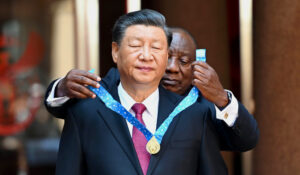When retired spy Peter Wright announced the existence of Spycatcher, his astoundingly indiscreet MI5 expose, in 1985, Margaret Thatcher’s government tried to block its publication in Australia. When that failed, it banned English newspapers from reporting on Wright’s allegations, including that MI5 had “bugged and burgled” the embassies of hostile countries and allies alike across London. But, eventually — as is often the case in liberal societies — the story came out. And once it did, there was no putting it back in the bottle.
In the West, information has a habit of wanting to be free. Every so often, government documents are recalled, or a court order prevents an issue from being discussed — but once the material is out in the public sphere, especially online, it is generally very hard to retract it. Since this is the norm for liberal societies, we sometimes underestimate how important it is to keep bodies of knowledge free and accessible to the public.
In today’s illiberal China, by contrast, we see what happens when the preservation of information for the public is less important than protecting the ruling system. The Chinese government is determined to prove it can be made to disappear at the snap of its fingers. In March, it was announced that large parts of CNKI, the major Chinese research and academic database, were being closed to overseas readers. The Chinese insist that this is just tit for tat, as it’s harder for their own researchers to get access to Western research databases. But that’s disingenuous. It’s true that there are now security-linked restrictions on some researchers from China getting access to Western hi-tech labs. Yet Chinese historians, political scientists and sociologists still have easy and convenient access to sources in the West, such as the UK National Archives.
Foreign academics studying China aren’t nearly so lucky. Overseas access to China’s historical materials — particularly those from the turbulent years of Mao Zedong’s rule — is now off-limits. This wasn’t always the case: a number of key archives including the Ministry of Foreign Affairs were open to foreign and domestic scholars during the first decade of this century, allowing for astonishing insights into the formation of Mao’s foreign policy (and, as it happens, helping China to make its current foreign policy more legible to the world). Then, in 2012, most of the collection was closed off again. No single explanation was given other than a cryptic “zhengli” (reordering or tidying up), but in retrospect, it marked the start of a decade of narrowing boundaries for academic and political discussion as Xi Jinping tightened his control over China.
The closing of archives might seem like a rather specialist complaint. But the wider issue — the illusion that once information is out in the open, it remains there — is more fundamental to the behaviour of writers, thinkers, and societies as a whole than the liberal world sometimes realises. China’s intellectuals have to reckon not just with the battle to get material out in the open, but the reality that any victory may be temporary, and the door may narrow or close again.
Consider the writing of Wang Xiaobo, a well-known Chinese novelist in the Eighties and Nineties. Unsure what to make of his wry and ironic fiction, the authorities first banned his work, then allowed it to be published in the relatively more liberal atmosphere of the mid-Nineties (though it has been only sporadically available in China since then). Wang’s story is neither unique nor particularly tragic: it is often the case in China that the same artist is both feted and censored. But his story is illustrative of the way that information and access come and go in China, a phenomenon that shapes attitudes towards reality.
In China, collective knowledge and memory are fragile. To give them more substance and staying power, Chinese intellectuals have come up with two different techniques. The first is to embrace the ironies surrounding the ephemerality of the written word. Wang’s most widely-known novel, Golden Age, now in a new translation for Penguin Classics by Yan Yan, is an account of the Cultural Revolution: the decade from 1966 to 1976 when China was racked by an internal civil war instigated by Mao in an act of purgative revenge against his own Communist Party, which he believed was sidelining him.
Yet Wang’s book doesn’t offer the kind of grand narrative sweep present in Jung Chang’s Wild Swans and other bestselling memoirs of the Cultural Revolution. Instead, it opens with a “sent-down youth” named Wang Er, a young man exiled to the countryside during Mao’s political storm. During his time in the village, he has a long on-off affair with a young female doctor until the two of them are discovered and forced to self-criticise. This tactic of demanding that political offenders recount their own “crimes” was a standard part of the project of ideological purification from the Forties onwards. But rather than going through a violent and painful humiliation typical of the Cultural Revolution, the wayward couple is simply made to write confessions of their Orwellian “sexcrimes”. The cadre in charge of monitoring the confessions seems to enjoy them for their prurient detail rather than seeking to use them for reforming the recidivists.
For much of the novel, Wang depicts this strange parallel Cultural Revolution, far removed from the violence in the cities. It is only later that we find out that the anti-hero has been witness to a horrific confrontation when he gives an understated but devastating account of a teacher who is persecuted until he throws himself from the window, and whose family are left standing on the ground next to scattered pieces of his brain. Like much of the writing of post-1949 history in China, Golden Age only makes sense when the missing elements are added in late in the day.
This mixture of irony and violence is not the kind of thing that the Party tends to favour. The Cultural Revolution is not completely off limits for discussion in China, but it’s hard to talk about it in tones that suggest it was anything other than a terrible historical error — the fault of a few erring leaders — that the Party itself successfully corrected, and that it’s time to move on. Wang’s approach, in contrast, implies that the wounds of that time have never really healed. That bleak interpretation must be one of the reasons that the book was illicit (though widely read).
Chinese writers today face even greater challenges than Wang. As Megan Walsh points out in her book, The Subplot, popular fiction is now written at high speed online, and is highly commercial, bringing in the kind of income that many Substackers can only dream of. Yet online readers can suddenly find their favourite epic blocked by censors. Unlike Wang’s physical novels, which could at least be hidden in private libraries during times of harsh censorship, today’s bestselling fiction can disappear overnight. Just because you read something today doesn’t mean you’ll find it tomorrow, whether it’s a historical document about the Cultural Revolution or a multi-part fiction series about lesbian martial arts champions. Fiction flickers on the screen: you have to catch it while you can.
This leads us to the second way that some seek to preserve memory, as illustrated in Ian Johnson’s new book Sparks, which gives a highly empathetic account of the way that China’s historical community gets around the rules that prevent the preservation of documentation and restrain historical analysis. The fate of the journal China Through the Ages (Yanhuang Chunqiu) offers a particularly disturbing example. For decades, the journal, officially permitted as a vehicle for the more liberal strain in Chinese Communist politics, was allowed to publish documents and essays that forced attention to the darker and more complex side of Chinese Communist history, even referencing figures such as Zhao Ziyang, the former party chief placed under house arrest after Tiananmen Square in 1989. Then, in 2016, the magazine was shut down in a political purge (although it reappeared under new management). Such unpredictability means that historians have to resort to other means to preserve material: either publishing as online “newsletters” that don’t require an official publication permit, or publishing abroad. The seeming solidity of an ISBN melts into the air — even more so in an age where digital-only publications can be switched off at a moment’s notice.
Today in the West, there are major, unresolved debates about how electronic data can be preserved when technology makes old formats such as CDs obsolete. There is also a growing divide between institutions and societies that can afford to keep databases switched on and those that can’t. But these choices are very different from deciding that a particular body of historical data — records of top Party leaders’ discussions; economic data about unemployment — should vanish because they are politically inconvenient. This fear of disappearance profoundly affects the way that China preserves its modern history. Libraries and even databases are still important, but the piles of printouts in a local historian’s back room, next to the rice cooker, or those videos of Cultural Revolution survivors kept on a private laptop take on a particular urgency because handing them over to an official archive could mean disappearance rather than preservation.
Wang Xiaobo died young in 1997, so we don’t know what he would have made of a 21st-century China which largely lives on the internet. He would probably have been pleased that his own books are reasonably freely available today. But he might well have been hard at work on a novel that reflected the here-today-gone-tomorrow fragility of history, fiction, and memory in today’s authoritarian China, where it is easier than ever to disseminate information and simpler than ever to cut it off.
Disclaimer
Some of the posts we share are controversial and we do not necessarily agree with them in the whole extend. Sometimes we agree with the content or part of it but we do not agree with the narration or language. Nevertheless we find them somehow interesting, valuable and/or informative or we share them, because we strongly believe in freedom of speech, free press and journalism. We strongly encourage you to have a critical approach to all the content, do your own research and analysis to build your own opinion.
We would be glad to have your feedback.
Source: UnHerd Read the original article here: https://unherd.com/






